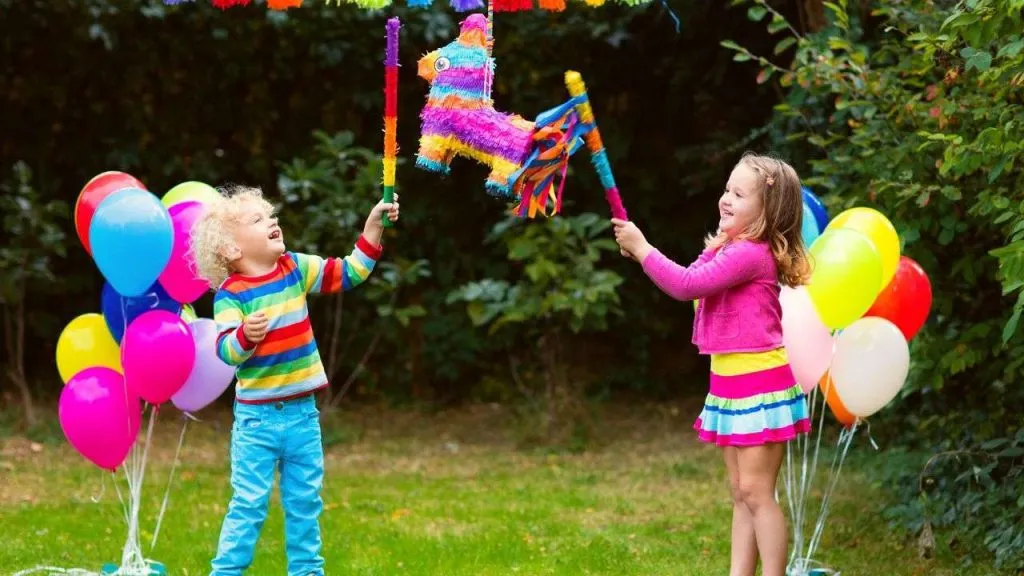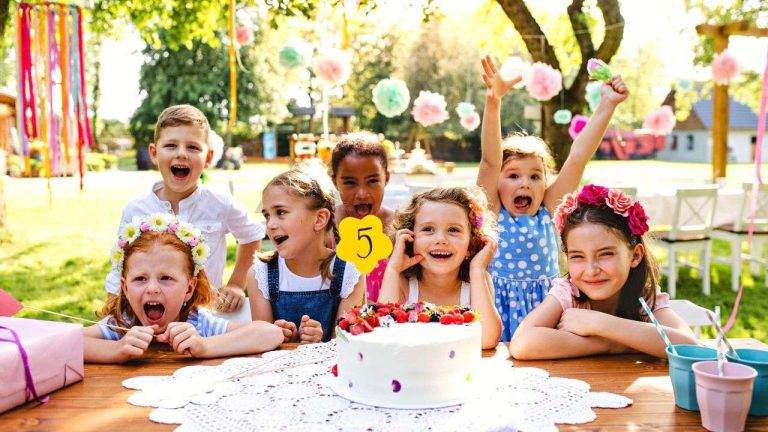The happy birthday song in Spanish is not just a fun melody but also an important aspect of Spanish-speaking cultures.
Birthdays hold a significant meaning in many cultures, and Spanish-speaking communities are no exception.
In this article, we’ll show you how to share the Spanish birthday experience with your kids, including teaching them the happy birthday song in Spanish and introducing them to regional customs and traditions.
By doing so, your children can gain a deeper understanding and appreciation of Spanish language and culture while having fun.
Let’s explore the exciting world of birthdays and make some joyful noise by singing happy birthday in Spanish!
Table of Contents
Don’t miss our informative and engaging article and How to Teach Spanish to Your Child Like a Pro, designed to help your little ones master the basics and develop their language skills. Check it out now and fuel their linguistic adventure!
How to Say Happy Birthday in Spanish
If you’re keen on teaching your child how to say happy birthday in Spanish, you’re in the right place!
As a Spanish teacher with years of experience working with English-speaking kids, I’ve got some tips and tricks to help you and your child master this classic birthday phrase.
By learning this classic phrase, you can enrich your child’s language learning experience and bring a touch of Spanish culture to your celebrations.
The Spanish phrase for “happy birthday” is “Feliz Cumpleaños.” To help with pronunciation, you can break down the words phonetically as follows:
- Feliz: feh-LEES
- Cumpleaños: COOM-play-ahn-yohs
Practising the pronunciation is crucial, and don’t hesitate to encourage your child to repeat the words after you.
Incorporate the phrase into a birthday setting, such as singing the happy birthday song in Spanish or using it when sending birthday wishes to friends or family members in Spanish.
Keep in mind that the pronunciation of Feliz Cumpleaños might vary slightly across Spanish-speaking countries. For example, in some parts of Spain, the “z” in “Feliz” might be pronounced as “th” (feh-LEETH).
Nevertheless, using the pronunciation mentioned above will ensure you’re understood no matter where you are.
Feliz Cumpleaños Meaning
Understanding the meaning and cultural significance behind “Feliz Cumpleaños” is essential when teaching your child about birthday greetings in Spanish-speaking countries.
This warm and affectionate phrase is a crucial part of the birthday celebration and an opportunity to gather with loved ones, share memories, and look forward to the future.
When we break down “Feliz Cumpleaños,” we see that “Feliz” means “happy” and “Cumpleaños” translates to “birthday.” It’s a heartfelt expression that conveys your best wishes for the person being celebrated.
In Spanish-speaking countries, the value placed on family and relationships is immense, and birthday greetings are no exception. By learning and understanding the meaning behind “Feliz Cumpleaños,” you and your child can better appreciate the warmth and connection this phrase represents.
With the foundation laid, let’s explore the “happy birthday song in Spanish” and how it can help reinforce the phrase “Feliz Cumpleaños” while also teaching a fun and festive tune to share with family and friends.

Planning a Birthday Party? Find Your Spanish-themed Party Essentials – Click Below and Shop Our Top Picks on Amazon!
The Happy Birthday Song in Spanish
Now that you and your child are familiar with the phrase “Feliz Cumpleaños,” it’s time to learn the happy birthday song in Spanish.
Not only is this a great way to practise the phrase, but it’s also a fun and festive tune to share with friends and family. Let’s explore the traditional lyrics and some regional variations that you may find interesting.
Traditional Happy Birthday Song Lyrics
The traditional happy birthday song in Spanish is called “Cumpleaños Feliz.” It’s sung to the same tune as the English version, making it easy for you and your child to pick up quickly. Here are the lyrics:
Cumpleaños feliz,
Cumpleaños feliz,
Te deseamos (name),
Cumpleaños feliz.
As you can see, the lyrics are quite simple. “Te deseamos” means “we wish you,” followed by the name of the person celebrating their birthday.
Singing this song together will help reinforce the phrase “Feliz Cumpleaños” and make the celebration even more enjoyable.
Regional Variations for the Happy Birthday Song in Spanish
Spanish-speaking countries often have their unique twists on the happy birthday song in Spanish. Let’s take a look at some regional variations.
Argentina
In Argentina, the “Cumpleaños Feliz” lyrics are similar to the traditional Spanish version. However, there is a slight variation, which makes it unique to Argentina. Here are the lyrics for the Argentine version of the “happy birthday song in Spanish”:
Que los cumplas feliz
Que los cumplas feliz
Que los cumplas (name)
Que los cumplas feliz.
This version is characterized by including the phrase “que los cumplas feliz” instead of repeating “Feliz cumpleaños.”
Venezuela
In Venezuela, the “Cumpleaños Feliz” lyrics have a slight variation from the traditional Spanish version. Here are the lyrics for the Venezuelan version of the “happy birthday song in Spanish”:
Cumpleaños feliz,
Te deseamos a ti,
Cumpleaños (name),
Cumpleaños feliz.
In Venezuela, it is common to sing “Ay Que Noche Tan Preciosa” before transitioning to “Cumpleaños Feliz” during birthday celebrations, showcasing the warmth and joy of the local culture while wishing the birthday person a world of happiness.
Here are the lyrics for “Ay Que Noche Tan Preciosa”:
Ay que noche tan preciosa
Es la noche de tu día
Todo lleno de alegría
En esta fecha natal
Tus más íntimos amigos
Esta noche te acompañan
Te saludan y desean
Un mundo de felicidad
Yo por mi parte deseo
Lleno de luz este día
Todo lleno de alegría
En esta fecha natal
Y que esta luna plateada
Brille su luz para ti
Y ruego a Dios porque pases
Un cumpleaños feliz
These lyrics convey warm wishes and joy for the birthday person, accompanied by their closest friends and loved ones. Singing “Ay Que Noche Tan Preciosa” is a beautiful way to celebrate and add a touch of Venezuelan culture to your child’s Spanish learning experience.
Spain
In Spain, the “Cumpleaños Feliz” lyrics are very similar to the traditional Spanish version. Here are the lyrics for the Spanish version of the “happy birthday song in Spanish”:
Cumpleaños feliz,
Cumpleaños feliz,
Te deseamos (name),
Cumpleaños feliz.
The lyrics are the same as the traditional Spanish version, with “Te deseamos (name)” meaning “we wish you” followed by the birthday person’s name.
One key difference to note is that the pronunciation of the “z” in “Feliz” may be pronounced as “th” (feh-LEETH) in some parts of Spain.
Singing the Spanish version of “Cumpleaños Feliz” is a great way to expose your child to the nuances of the language and regional variations. Practising and singing the song together is an excellent opportunity to reinforce the phrase “Feliz Cumpleaños” while also enjoying a fun and festive tune to share with family and friends.
Las Mañanitas (Mexico)
In Mexico, people traditionally sing a song called “Las Mañanitas” on someone’s birthday, especially in the morning. It’s a beautiful serenade meant to start the day on a joyful note. Here are the lyrics:
Estas son las mañanitas,
Que cantaba el Rey David,
Hoy por ser día de tu santo,
Te las cantamos a ti.
Despierta, mi bien, despierta,
Mira que ya amaneció,
Ya los pajaritos cantan,
La luna ya se metió.
Qué linda está la mañana,
En que vengo a saludarte,
Venimos todos con gusto,
Y placer a felicitarte.
El día en que tú naciste,
Nacieron todas las flores,
Y en la pila del bautismo,
Cantaron los ruiseñores.
Ya viene amaneciendo,
Ya la luz del día nos dio,
Levántate de mañana,
Mira que ya amaneció.
While “Las Mañanitas” isn’t a direct translation of the happy birthday song in Spanish, it’s a lovely alternative with cultural significance.
In this section, we’ve covered just a few variants of the happy birthday song in Spanish from different countries. With 21 Spanish-speaking countries worldwide, each may have its unique twist on the song, and including them all would make for a very lengthy article.
If you have a version of “Feliz Cumpleaños” from a particular country that you’d like to see featured here, please don’t hesitate to contact us and share your version. We’d love to learn more and help enrich the learning experience for everyone.
Tips for Teaching the Cumpleaños Feliz in Spanish
To make learning the happy birthday song in Spanish more engaging, try incorporating it into your child’s daily routine or language lessons.
You could sing it together in the morning, replace the person’s name with different family members’ names, or even create a game to match the Spanish lyrics with their English counterparts.
With these songs under your belt, you and your child can enjoy a deeper connection to Spanish-speaking cultures and add a touch of Spanish flair to your birthday celebrations.
Spanish Birthday Traditions
In this section, we will explore some popular Spanish birthday traditions that you and your child can learn about and even incorporate into your celebrations.
These traditions are not only fun but also provide a rich cultural experience while learning the Spanish language.

Piñatas
A piñata is a colourful, decorated container often made of papier-mâché, filled with small toys, candies, and sometimes fruit.
It’s a popular party activity, especially in Mexico and other Latin American countries. Children take turns and try to break the piñata by hitting it with a stick while others sing and cheer.
Once the piñata is broken, everyone rushes to collect the treats inside.
As an alternative for younger children, piñatas offer an exciting twist. These colorful hanging decorated containers have strings attached, with each child given the opportunity to grab one. When the moment arrives, at the count of three, every child eagerly pulls their designated string, collectively aiming to break open the piñata and reveal the hidden treats within.
Birthday Cakes
Birthday cakes are a tradition observed worldwide, but in Spain and Latin America, they come with a unique touch. In these regions, when celebrating someone’s birthday, family and friends gather around the cake, typically embellished with candles, and join in singing the happy birthday song. Once the song concludes, it is customary for the birthday person to blow out the candles while making a wish.
Quinceañera
A ‘quinceañera’ (also known as ‘Fiesta de Quince Años’ in many Spanish-speaking countries) is a significant milestone in the life of a young Hispanic girl. It’s a lavish celebration that marks a girl’s 15th birthday and her transition from childhood to young adulthood.
The event is celebrated in many Latin American countries and among Hispanic communities in the United States. It often includes a reception with music, dancing, and a feast.
The birthday girl, known as the quinceañera, typically wears an elegant gown and may have a court of honour, comprising family and friends.
Serenades
In some Latin American countries, particularly Mexico, it has been traditional to serenade the birthday person early in the morning on their special day. Friends and family, or even a hired mariachi band, will gather outside the birthday person’s home and sing songs like “Las Mañanitas” to wake them up and start the celebration.
These are just a few examples of the rich and diverse birthday traditions in the Spanish-speaking world. By learning about and participating in these customs, your child can gain a deeper understanding of the language and the vibrant cultures that it represents.
Ideas for Incorporating Spanish Birthday Traditions into Your Family Celebrations
Bringing Spanish birthday traditions into your family celebrations is a fun and educational way to introduce your child to the culture and language. Here are some ideas to help you incorporate these customs into your next birthday party:
Host a piñata party
You can purchase or make your own piñata to add a festive and lively touch to your child’s birthday party. Fill it with small toys, candies, and other treats, and let the children take turns trying to break it open. This activity is not only entertaining but also helps teach your child about a popular Latin American tradition.
Learn and sing Spanish birthday songs
Teach your child “Cumpleaños Feliz” or other regional variations of the happy birthday song in Spanish. You can also introduce them to “Las Mañanitas” if you’re celebrating a Mexican-style birthday. Singing these songs together is a fun way to practice pronunciation and learn new vocabulary.
Organize a Spanish-themed birthday party
Choose a theme from a Spanish-speaking country, such as a Mexican fiesta, an Argentine tango party, or a Spanish flamenco celebration. Encourage guests to dress accordingly, serve traditional dishes, and play music from the chosen country.
Learn some Flamenco or Latin dancing
Teach your child and their friends a traditional Spanish or Latin American dance, such as salsa, merengue, or flamenco. Dancing is a fun and engaging way to introduce kids to the rich cultural heritage of the Spanish-speaking world.
By incorporating these Spanish birthday traditions into your family celebrations, you can create a fun and immersive learning experience for your child, deepening their understanding and appreciation of the language and the diverse cultures it represents
How to Say Happy Belated Birthday in Spanish
Sometimes we might forget or miss someone’s birthday, but it’s never too late to send your warm wishes.
To say happy belated birthday in Spanish, you can use the phrase “Feliz cumpleaños atrasado.”
Here’s a breakdown of the phrase:
- Feliz: happy
- Cumpleaños: birthday
- Atrasado: belated, late
You can also use the phrase “Feliz cumpleaños con retraso,” which translates to “happy birthday with delay.”
Additionally, you can apologize for the delay by saying “Perdón por el retraso” or “Disculpa por el retraso,” which both translate to “sorry for the delay.”
By learning these expressions, you and your child can practice their Spanish language skills while also learning about good manners and etiquette in Spanish-speaking cultures.
How to Say Happy Early Birthday in Spanish
If you want to wish someone a happy birthday in advance, you can use the phrase “Feliz cumpleaños adelantado” in Spanish.
Here’s a breakdown of the phrase:
- Feliz: happy
- Cumpleaños: birthday
- Adelantado: early, in advance
Additionally, you can express excitement for the upcoming celebration by saying “¡Estoy emocionado/a por tu cumpleaños!” which means “I’m excited for your birthday!” This way, you can further engage in conversation and share your excitement with friends or family members who speak Spanish.
Final words and Next Steps
Teaching your child the happy birthday song in Spanish and introducing them to various birthday traditions enhance their language learning experience and appreciation for diverse cultures.
We hope you enjoyed learning about these customs and phrases.
For more ways to immerse your child in the Spanish culture and language, check out our articles on Colors in Spanish, Numbers in Spanish, the Spanish Alphabet, and Spanish Lullabies perfect for language learning.
FAQ
What is the meaning of Feliz cumpleaños?
“¡Feliz cumpleaños!” is the Spanish phrase for “Happy Birthday!” The literal translation of the phrase is “happy completion of a year,” which highlights the significance of reaching another year of life.
How do you say Happy Birthday and best wishes in Spanish?
To say “Happy Birthday and best wishes” in Spanish, you can use the phrase “Feliz cumpleaños y los mejores deseos.” It’s a straightforward and commonly used expression to convey your good wishes.
How to thank someone for wishing you a happy birthday in Spanish?
To express gratitude for someone’s birthday wishes in Spanish, you can say “Muchas gracias por tus deseos de cumpleaños,” which translates to “Thank you very much for your birthday wishes.” Other common phrases include “Te agradezco por tus buenos deseos” (I appreciate your good wishes) and “Gracias por acordarte de mi cumpleaños” (Thank you for remembering my birthday).
How do you wish someone happiness in Spanish?
To wish someone happiness in Spanish, you can use the phrase “Te deseo felicidad” which means “I wish you happiness.” Alternatively, you can use “Que tengas mucha felicidad” which means “I hope you have a lot of happiness.” Other common expressions include “Que seas feliz” (May you be happy) and “Te deseo toda la felicidad del mundo” (I wish you all the happiness in the world).





